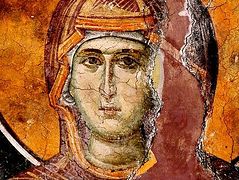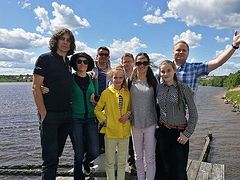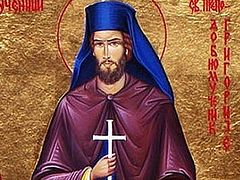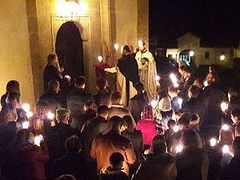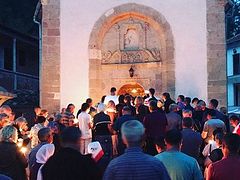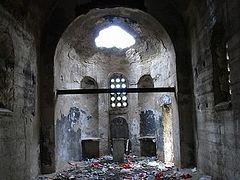“On this street, all the houses are empty now,” says Biljana, from the Serbian village of Koretište in Kosovo. Since the war ended in 1999 and around 250,000 Serbs were forced to flee their homes following the withdrawal of the Yugoslav Army and subsequent waves of anti-Christian violence, it’s been a struggle to hang on for those who have managed to remain. They live in isolated villages, often referred to as “enclaves”—enclaves of Orthodox Christianity, of Christ, of the Church, amidst a chaotic world that surrounds them on all sides, putting ever more pressure on them to leave forever.
For the Orthodox Christians remaining in Kosovo, finding a stable job is almost impossible. A new society has descended upon Kosovo, one that could be fairly referred to as an apartheid state, in which the Muslim Albanian majority, while not so rich itself, is certainly dominant and has experienced growth and development since the end of the war, while the remaining Orthodox Christian Serbs have been left in the dust, relegated to isolated villages in mountainous areas. There is not a single city in Kosovo that has any substantial Serbian population, save for Mitrovica in the far north which borders Central Serbia and has a Serbian majority. In cities that used to be even up to 40% Serbian Orthodox, the number of Orthodox Christians left, mostly elderly, can be almost counted on one’s hands. A people and a history are thus in the terrifying process of being erased, blotted out, as if they never were. Orthodox Christians are permitted to exist, in some poor manner, in far-off villages. And even then, they are often offered large sums of money by richer Albanians to sell their ancestral homes and leave Kosovo forever.
Suzana, age 35, is the mother of four children and lives in such a Serbian enclave. Her husband earns about 80 euros per month as a laborer—around $100—while Suzana tends to the children and maintains a garden for food, along with a cow, which provides the family with milk and cheese. Life is certainly difficult, but they manage to scrape by somehow.
“It feels as if the world has forgotten us,” she says, talking about what it’s like to live in an isolated enclave, surrounded by a society in which she is not permitted to participate. It must be made clear that, it is not that Serbs do not wish to participate in the larger Albanian society around them, that they do not want to work in Albanian companies or shop in their stores, but that they are not permitted to. It is, in truth, a country in which discrimination on an ethnic and religious basis is endemic, tolerated to an extent that it’s almost not even noticed anymore by the foreigners who work in Kosovo in various foreign offices and NGOs.
And truly, it is as if they have been left in the dust, in a past that no longer exists, as if they must cling to a world that they themselves know is no longer there. They often still live in houses that were built before WWII and are in very poor condition, while the Albanian Muslim majority builds beautiful new homes all around them. They use tractors built many decades ago in the former Yugoslavia to till their fields, while the Albanian Muslims have long abandoned farming in favor of more profitable, “modern” jobs. Orthodox Christians in Kosovo suffer both a material poverty and a psychological isolation. Since they cannot normally leave their villages, now filled with old, empty, dilapidated houses, it often seems as if the whole world is collapsing in on itself around them. To be an Orthodox Christian in Kosovo can often mean feeling that you are the last to hold out, the last to still bear witness to Christ’s resurrection, amidst a world that is collapsing around you.

The women can use their talents and creativity to bring much needed economic support to their families. But it isn’t just about the money. Slađana, the matriarch of a large family in one enclave village, used to work in a textile factory, until it was shut down after the war. Since then, she has had no formal employment, but has had to make do with subsistence farming and odd jobs. But, upon being approached by Draganac Monastery to be included in the new Women’s Wool Collective, as the project has been named, she feels as if new life has been injected into her. “I feel alive again,” she says. She and some of her friends stay up until 2 am to make traditional style peasant bags for sale through the Collective, not because anyone forces them to, but because doing useful, creative work with their own hands, to provide for their families, gives them a new purpose and meaning.

The Collective provides local families with hope. If a woman sells one sweater or two bags, she has already doubled her family’s monthly income. And in turn, people in the West can receive completely unique, handmade, traditional products that they won’t be able to find anywhere else. Everything is made by the women themselves, using their own knowledge, using traditional patters and designs. One sweater takes 40-50 hours of work to complete, while the traditional peasant bags for sale can take up to two weeks, depending on the complexity of the pattern. Some of these bags are themselves pieces of history, as the women sometimes use antique fabrics that they estimate are about 100 years old, passed down through their families and preserved in excellent condition. Each one is unique.
Help a sister out. Help her support her family. We all have a choice where to buy what we need, what we want. We could buy from a large, well-known corporation, or, we could buy completely unique products that tangibly help impoverished women achieve financial independence. Help Slađana pay school fees for her grandchildren and have heating for the winter. Help Suzana buy food and pay for her children’s needs. Show them that the world has not forgotten them; that truly, the Church is universal and we are all in this together. Bring hope and new life to beleaguered Orthodox Christian Serbian communities in Kosovo.
Please visit the page of the Women’s Wool Collective on the site of Draganac Monastery, and spread the word: http://www.draganacmonastery.com/product-category/women-wool-collective/.









